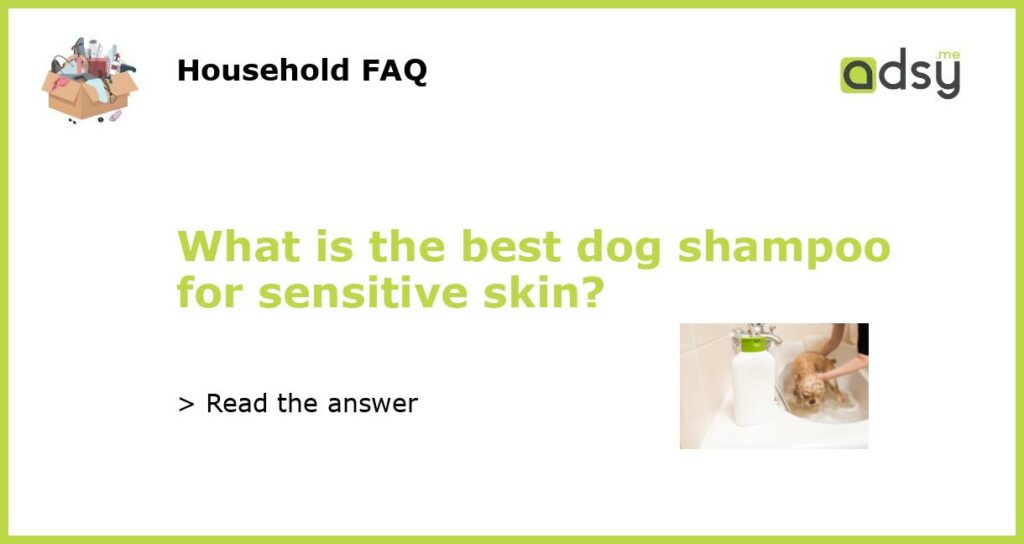Understanding Sensitive Skin in Dogs
Dogs, just like humans, can experience sensitive skin. It may manifest as itchiness, redness, flaking, dryness, or even rashes. If your furry friend has sensitive skin, it’s important to choose the right shampoo that will soothe and nourish their skin without causing any further irritation. Understanding the causes and symptoms of sensitive skin in dogs can help you make an informed decision when selecting a dog shampoo.
Factors to Consider when Choosing a Dog Shampoo for Sensitive Skin
When it comes to selecting the best shampoo for dogs with sensitive skin, there are a few factors to consider:
- Hypoallergenic Formulation: Look for dog shampoos that are specifically formulated for sensitive skin, as they are less likely to contain ingredients that may trigger irritation.
Moisturizing Properties: Dry skin is a common issue in dogs with sensitive skin, so choosing a shampoo that provides hydration and nourishment can help alleviate dryness. - Fragrance-free or Mild Fragrance: Strong scents and harsh chemicals in shampoos can worsen skin sensitivity. Opt for fragrance-free or lightly scented shampoos to minimize the risk of irritation.
All-natural Ingredients: Avoid shampoos that contain artificial colors, fragrances, parabens, sulfates, and other potentially harmful ingredients. Natural and organic ingredients are generally gentler on sensitive skin. - Effectiveness against Skin Issues: Depending on the specific skin issues your dog has, such as allergies or dermatitis, choose a shampoo that is known to effectively address those concerns.
Top Dog Shampoos for Sensitive Skin
After considering the factors mentioned above, here are some of the best dog shampoos for sensitive skin:
- Earthbath Hypo-Allergenic Shampoo: This hypoallergenic shampoo is made from natural ingredients and is suitable for dogs with allergies or sensitivities. It cleanses gently while moisturizing and soothing the skin.
- Burt’s Bees Oatmeal Shampoo: Made with colloidal oat flour and honey, this shampoo is designed to relieve dry and itchy skin. It is pH balanced and gentle enough for sensitive skin.
- Veterinary Formula Clinical Care Antiparasitic & Antiseborrheic Shampoo: If your dog has sensitive skin and is also dealing with parasites or seborrhea, this shampoo is a great option. It contains salicylic acid, coal tar, and micronized sulfur to relieve itching and flaking.
- 4-Legger Certified Organic Dog Shampoo: This all-natural shampoo is made with organic oils and aloe vera to soothe and moisturize sensitive skin. It is free from synthetic fragrances, sulfates, and parabens.
- Honeydew Oatmeal Pet Shampoo: Formulated with soothing oatmeal extract and aloe vera, this shampoo is gentle on sensitive skin. It also helps to moisturize and nourish the coat, leaving it soft and shiny.
How to Rinse and Dry Your Dog after Shampooing
After shampooing your dog with the chosen sensitive skin shampoo, it’s important to rinse thoroughly to remove all traces of shampoo from their fur and skin. Leaving residue behind can potentially lead to further irritation or dryness. Here’s how to rinse and dry your dog properly:
- Use lukewarm water to thoroughly rinse your dog, starting from their head and working your way down to their tail.
- Ensure that all areas, especially those prone to irritation, are well-rinsed.
- Dry your dog gently with a clean towel or a pet-friendly hairdryer on a low-heat setting.
- Avoid vigorously rubbing the towel against your dog’s skin, as it can cause friction and irritation.
- Always pat your dog dry and allow their fur to air dry completely before brushing or grooming.
Consult a Veterinarian for Severe or Persistent Skin Issues
If your dog’s sensitive skin issues persist or worsen despite using a suitable shampoo, it is recommended to consult a veterinarian. They can determine if there are any underlying health conditions causing the sensitivity or if a different treatment approach is needed. A veterinarian can provide guidance on the best course of action for your dog’s specific needs.






